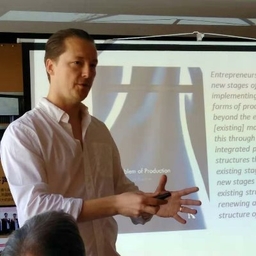
Per L. Bylund
Contributor at Freelance
The world needs economic literacy. Aso prof #entrepreneurship @okstate. And @Ratio_Institute, @mises Books: https://t.co/vgTuivOv8H Tweets my own.
Articles
-
3 weeks ago |
journals.aom.org | Per L. Bylund |Alexander N. Cartwright |Mark Packard |Steve Trost
*denotes a reference that is included only in Appendix A.
-
Feb 8, 2025 |
mises.org | Per L. Bylund
It looks like the beltway libertarians at places like Reason and Cato have no interest in explaining the libertarian position on naturalization and citizenship. Try an internet search of the phrase “libertarian position on naturalization and citizenship”—or some similar variation of those words. What you will find is a wide array of articles on immigration from the usual “libertarian” sources. But, that hardly answers our question since immigration and naturalization are two very different things.
-
Feb 7, 2025 |
mises.org | Per L. Bylund
As immigration levels have grown in many Western countries, concerns over the politically destabilizing effects of large-scale migration have prompted a continuing debate over citizenship. As we’ve noted here at mises.org, many European states have consequently moved toward greater restrictions on citizenship. Other states, such as the United States and Canada, have yet to embrace any new limitations on naturalization laws.
-
Feb 6, 2025 |
mises.org | Per L. Bylund |Ryan McMaken
Ryan McMaken and Economist Per Bylund discuss the nature of money in our paper-money world. Are Bitcoin and gold money? If not, how do they become money? Register for Our Enemy The Bureaucracy now at https://Mises.org/Phoenix25. Get free copies of What Has Government Done to Our Money? at https://Mises.org/RothPodFREEThe World at War by Ralph Raico: https://Mises.org/RaicoWarBe sure to follow Radio Rothbard at https://Mises.org/RadioRothbardRadio Rothbard mugs are available at the Mises Store.
-
Feb 4, 2025 |
mises.org | Per L. Bylund
It’s become fashionable among economists to refer to knowledge as a silver-bullet explanation for all kinds of phenomena and processes. Whereas Hayek (and Hayekians) is known for the “knowledge problem,” mainstreamers, too, rely on a vague conceptualization of knowledge (specifically, the lack thereof) to explain important economic processes. Both exogenous and endogenous growth theories, for example, suggest “knowledge” explains an economy’s growth and, thus, society’s prosperity.
Try JournoFinder For Free
Search and contact over 1M+ journalist profiles, browse 100M+ articles, and unlock powerful PR tools.
Start Your 7-Day Free Trial →X (formerly Twitter)
- Followers
- 47K
- Tweets
- 80K
- DMs Open
- Yes

"The consumer is sovereign when, in his role of citizen, he has not delegated to political institutions for authoritarian use the power which he can exercise socially through his power to demand (or refrain from demanding)." Hutt (1936, p. 257)

RT @EconBreau: I hate how they just casually talk about redistributing other people's money & pretend to be moral. Charity is moral, what…

"As an economist" means (and should mean) answering the question from the perspective of economic theory and using sound economic reasoning.

As an economist, I cannot answer questions about what the interest rate "should be." The answer depends on what the goal is. If the goal is to have the economy create as much prosperity as possible, then my answer is to let the market set its rate. Other goals, other answers.

